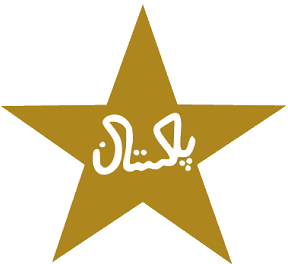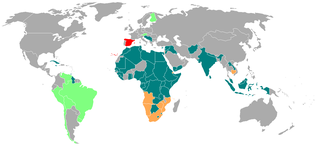
Harare is the capital and most populous city of Zimbabwe. The city proper has an area of 940 km2 (371 mi2) and a population of 2,123,132 in the 2012 census and an estimated 3,120,917 in its metropolitan area in 2019. Situated in north-eastern Zimbabwe in the country's Mashonaland region, Harare is a metropolitan province, which also incorporates the municipalities of Chitungwiza and Epworth. The city sits on a plateau at an elevation of 1,483 metres above sea level and its climate falls into the subtropical highland category.

The International Cricket Council (ICC) is the world governing body of cricket. It was founded as the Imperial Cricket Conference in 1909 by representatives from Australia, England and South Africa. It was renamed as the International Cricket Conference in 1965, and took up its current name in 1987. The ICC has its headquarters in Dubai, UAE.

The Asian Cricket Council (ACC) is a cricket organisation which was established in 1983, to promote and develop the sport of cricket in Asia. Subordinate to the International Cricket Council, the council is the continent's regional administrative body, and currently consists of 26 member associations. Jay Shah is the current president of Asian Cricket Council.

Cricket has a considerably lower profile in Scotland than it has in neighbouring England. Scotland is not one of the twelve leading cricketing nations which play Test matches, but the Scottish national team is now allowed to play full One Day Internationals even outside the Cricket World Cup, in which Scotland competed in 1999, 2007, and 2015. Scotland has a well established recreational cricket structure. In 2016 it was estimated that around 17,000 people play cricket in Scotland.
The Afro-Asia Cup was a cricket competition played for the first time in 2005 and which is intended to run for at least three years. The idea was to raise money for the Asian Cricket Council and the African Cricket Association, and the whole venture was given a massive boost when the ICC, somewhat controversially, agreed to give the series of one-day matches full ODI status.

Central is the largest of Botswana's districts in terms of area and population. It encompasses the traditional homeland of the Bamangwato people. Some of the most politically connected Batswana have come from the Central District, including former President Sir Seretse Khama, former President Festus Mogae, and former President Lt. General Seretse Ian Khama. The district borders the Botswanan districts of Chobe in the north, North-West in the northwest, Ghanzi in the west, Kweneng in southwest, Kgatleng in the south and North-East in the northeast, as well as Zimbabwe also in the northeast and South Africa in the southeast.
ICC Americas is an international body which oversees cricket in countries in the Americas. It is a subordinate body to the International Cricket Council (ICC). The organisation currently has 17 members, located in North America, Central America, South America, and the Caribbean, and is responsible for the development, promotion and administration of the game in the above regions.
ICC East Asia-Pacific is the International Cricket Council region responsible for administration of the sport of cricket in East Asia and the Pacific area.
The International Cricket Council's executive committee votes for the hosts of the tournament after examining the bids made by the nations keen to hold a Cricket World Cup. All the World Cup events so far have been held in nations in which cricket is a popular sport. Most of the tournaments have been jointly hosted by nations from the same geographical region, such as South Asia in 1987, 1996, and 2011, Australia in 1992 and 2015, Southern Africa in 2003 and West Indies in 2007.

Cricket South Africa (CSA) is the governing body for both professional and amateur cricket in South Africa. In 1991, the separate South African Cricket Union and the South African Cricket Board merged to form the United Cricket Board of South Africa (UCB), ending enforced racial separation governance in South African cricket. Cricket South Africa was formed in 2002, and initially ran parallel to the UCB, before becoming the sole governing body in 2008. As an affiliate of the South African Sports Confederation and Olympic Committee (SASCOC), and a full member of the International Cricket Council (ICC), CSA administers all levels of cricket in South Africa, including the national teams in all three formats for both men and women.

The history of cricket in Pakistan predates the creation of the country in 1947. The first international cricket match in what is Pakistan today was held in Karachi on 22 November 1935 between Sind and Australia. The match was seen by 5,000 Karachiites. Cricket was introduced by the British during their colonial rule of British India, which covered the area now known as Pakistan. Cricket is the most popular sport in the country. The Pakistan Cricket Board controls all domestic cricket in Pakistan and the national teams. Pakistan is an official member of the International Cricket Council and the Asian Cricket Council. Pakistan has won the Cricket World Cup in 1992, ICC T20 World Cup in 2009, the ICC Champions Trophy in 2017, the ICC Under-19 Cricket World Cup in 2004 and 2006, the ACC Asia Cup in 2000 and 2012, and the ICC Test Championship in 2016.

Philippine Cricket Association (PCA), formerly the Philippines Cricket Association, is the official governing body of the sport of cricket in the Philippines. It is also responsible for its national team.

Rugby union in Zimbabwe is a popular sport and ranks after association football and cricket as one of the oldest and most popular sports in the country. The Zimbabwe national team, commonly known as the Sables, have been playing international rugby since the early 1900s and have made appearances in two Rugby World Cups Zimbabwe at the Rugby World Cup on two occasions. As with rugby union in Namibia, the country's lack of a professional structure, and opportunity for player's to earn an income playing rugby, has been a problem for national organisers.

The Namibia national cricket team, nicknamed the Eagles, is the men's team that represents the Republic of Namibia in international cricket. It is organised by Cricket Namibia which became an associate member of the International Cricket Council (ICC) in 1992.

Sports in Botswana is diverse and reasonably well-developed. Though football, netball and athletics remain the most popular sports, numerous other sporting codes, including cricket, rugby, judo, swimming and tennis are active in the national sporting landscape. The Botswana National Sport Commission (BNSC), together with the Botswana National Olympic Committee (BNOC) and Ministry of Youth, Sport and Culture (MYSC) are responsible for the overall management of sport in the country. In addition, there over 30 National Sport Federations (NSFs) and three school sport federations
Mary-Anne Musonda is a Zimbabwean cricketer and the current captain of the women's national cricket team, for which she is a right-handed batter. She also has a master's degree in Development Finance from the University of Cape Town.

The COVID-19 pandemic has caused disruption to cricket around the world, mirroring its impact across all sports. Around the world and to varying degrees, leagues and competitions have been cancelled or postponed.

Third Conference of the Non-Aligned Movement on 8–10 September 1970 in Lusaka, Zambia was the third conference of the Non-Aligned Movement. A preparatory meeting of Foreign Ministers drafted a number of resolutions which were considered by the Summit Conference. President of Zambia Kenneth Kaunda opened the conference by underlining non-alignment as "the natural choice at the time of increased hostility created by ideological conflicts in the bipolar world"
Margaret Ngoche or Margaret Banja is a Kenyan cricketer and a former captain of the Kenya women's cricket team. Several members of Ngoche's family have played for the Kenyan team, including her brothers Lameck Onyango, Nehemiah Odhiambo, Shem Ngoche and James Ngoche, and her sister Mary Bele. Prior to playing cricket, Ngoche also played football for two years.














